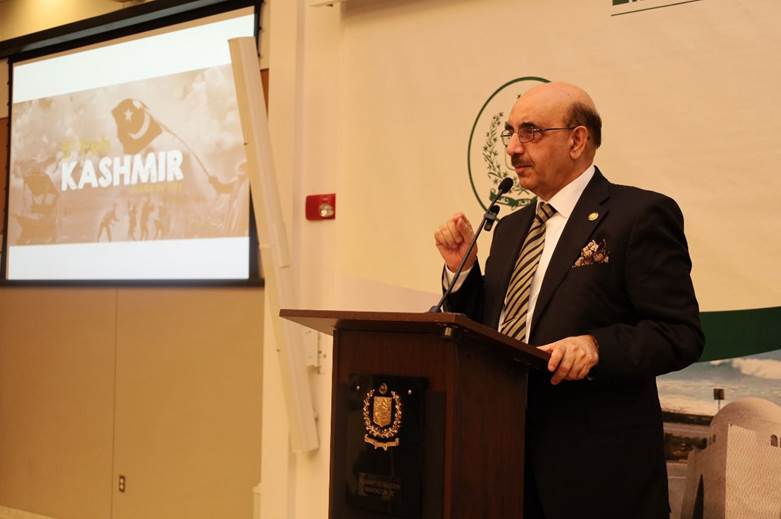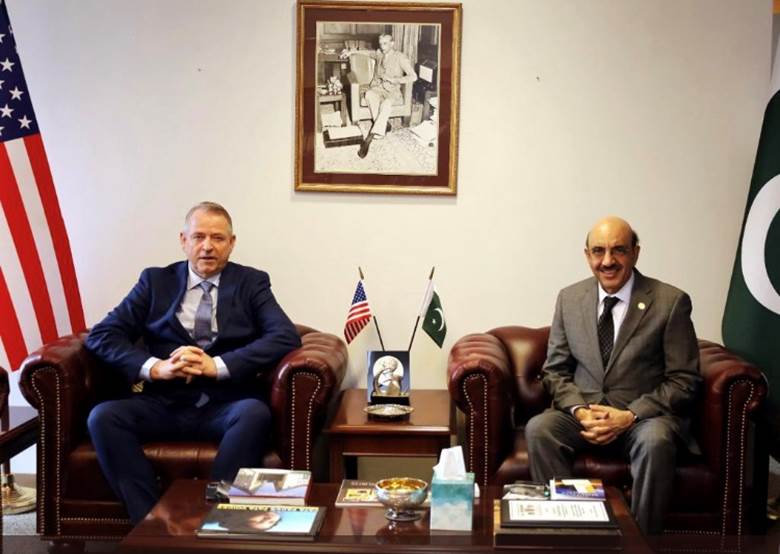


“It is the responsibility of the international community to save them,” said Ambassador Khan, a former president of Pakistan-administered Azad Kashmir. “I appeal to your conscience. We appeal to your convening power to come to the rescue of the people of illegally occupied Jammu and Kashmir”

Lars Rise and Ambassador Masood Khan
“Kashmir Is a Powder Keg in South Asia,” Warns Ambassador Masood Khan
By Elaine Pasquini

Washington: “The Indian actions in illegally occupied Jammu and Kashmir is a genocide under the definition of Article II of the Genocide Convention,” Masood Khan, Pakistan’s Ambassador to the United States, told guests gathered at the Pakistan Embassy on February 5 in observance of Kashmir Solidarity Day. “It is an act of ethnic cleansing. It is a crime against humanity.”
“We feel the pain of our Kashmiri brothers and sisters,” he said. “Their wounds are our wounds. Kashmir is a keystone of the foundations of Pakistan. It cannot be separated from us.”
Ambassador Khan noted that the people of Pakistan have made huge sacrifices fighting for Kashmir for the past seven decades, not for a piece of land, “but because it is a moral responsibility upon us,” he said. “We are fighting for the inalienable right to self-determination of our Kashmiri brothers that was promised to them by UN Security Council resolutions and by the international community.”
“The Kashmiris are the most disenfranchised people on the face of the earth,” he said. “They are victims of genocide, crimes against humanity and ethnic cleansing. Kashmir is a powder keg in South Asia that threatens regional peace and stability.”
“It is the responsibility of the international community to save them,” said Khan, a former president of Pakistan-administered Azad Kashmir. “I appeal to your conscience. We appeal to your convening power to come to the rescue of the people of illegally occupied Jammu and Kashmir.”
Lars Rise, former member of the Norwegian Parliament and a true friend of the people of Jammu and Kashmir, insisted that everyone must stand and protest for the right to self-determination of the Kashmiri people.
The right to self-determination, he pointed out, was not only promised to the Kashmiri people by the United Nations Security Council, but the late Jawaharlal Nehru, India’s first prime minister, also made that pledge to the Kashmiris. “It is a sad day that even after 77 years we are still talking about lack of this right,” Rise said.
Highlighting the situation in the illegally occupied territory, especially after August 5, 2019, when the Indian government repealed Articles 370 and 35A from its constitution thereby revoking Kashmiris’ right to self-determination, Rise said that Kashmiris were denied their basic human rights and a communication blockade in the territory was imposed. “So now we can say that Kashmir is like a barrel of gun powder,” he added. “It’s a very dangerous situation.
Lamenting that Kashmir was a forgotten cause for the international community, Rise urged supporters of Kashmiris’ right to self-determination to “pool efforts and resources in order to make the international community listen to the very important voices from Kashmir.”
In a recorded video message, Pakistani Senator Mushahid Hussain Syed compared India’s actions in Kashmir to Israel’s exploits in Gaza which it illegally occupies and terrorizes. India, he said, has been exposed as a state sponsoring cross-border terrorism. He also noted the transformation of India into a Hindutva state under the leadership of Prime Minister Narendra Modi since 2014. He lauded the courage and resilience of the Kashmir men and women for being steadfast in their widespread struggle for their inalienable right to self-determination.
Hussain also underscored the need for an “empowered mindset” in the international community in order to assess what needs to be done regarding the Kashmir issue. Citing the example of Black Lives Matter after the killing of George Floyd, he pointed out that raising awareness would help activate civil society to stand up for a just cause.
Afzal Khan, British Labor Party MP, in his recorded message observed that the international community, including the United Kingdom, has a moral responsibility to help address the issue of Jammu and Kashmir. Expressing solidarity with the people of Kashmir, he assured them his continued support to the just cause of Kashmir and to double his efforts for raising awareness about the suffering of the Kashmiri people.
Ilyas Masih, representing the Pak-American Christian community, called upon the participants to raise awareness about the plight of Kashmiris, especially the youth.
Dr Asma Shakir Khawaja, executive director of the Center for International Strategic Studies Azad Jammu and Kashmir, noted the Kashmiris’ determination for the past 76 years despite suffering subjugation. “India is an illegitimate entity in Kashmir,” she said. History bears testimony to the fact that illegal occupation has to come to an end and “India has to leave the land of Kashmir so Kashmiris would have their right to decide what future they want for themselves.”
Secretary-General of Kashmir Civitas Dr Farhan Mujahid Chak in his message called upon the need to remain committed to raising the awareness about Indian atrocities against the Kashmiri people. Kashmir remains on the backburner and has been a neglected conflict for too long, he noted. “This year let us make a special solemn pledge that we will remain adamant to raise awareness of the colonial policies – the draconian communication strategies, the grotesque violations of human rights and the abhorrent practices of fake encounters, murdering and imprisoning journalists and civil society activists.”
Sardar Zareef Khan, advisor to the president of Azad Kashmir, told attendees that expressing solidarity with Kashmiris encourages the spirit of Kashmiris to struggle for their legitimate cause. He thanked the government and the people of Pakistan for keeping the issue of Kashmir alive.
Altaf Wani, chairman of the Kashmir Institute of International Relations, highlighted the need for exposing the Indian government by presenting realities before the international community.
George Washington University professor Dr Imtiaz Khan, a native of Indian-occupied Kashmir, highlighted the harrowing crimes of the Indian forces against innocent women and children of Kashmir. He also noted that India was making demographic changes in the occupied territory in order to reduce the Muslim majority so it would become a minority.
Victoria Schofield, renowned author and historian on Kashmir, in an audio message stated that it pained her to see that the issue of Kashmir remained unresolved.
Kashmir Solidarity Day is observed in Pakistan and around the world each year on February 5 to show support for the people of Jammu and Kashmir living under illegal Indian occupation and to honor those who died attempting to free their homeland.
(Elaine Pasquini is a freelance journalist. Her reports appear in the Washington Report on Middle East Affairs and Nuze.Ink.)

